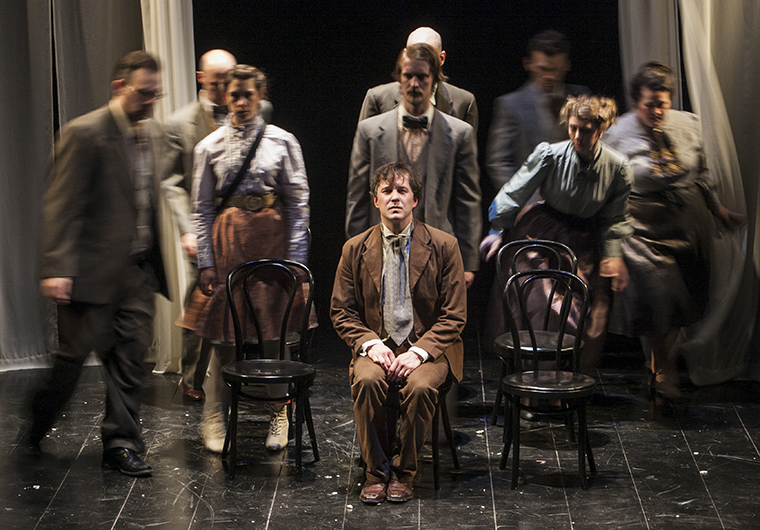‘The Jewels’ a lackluster attempt to shine
April 14, 2014
In its world premiere, “The Jewels,” from TUTA Theatre Chicago at the DCA Storefront Theatre, 66 E. Randolph St., shows that Paris, the city of light and romance, is not always perfect in springtime.
“The Jewels” follows the aging Rene Lantin on a turbulent path, barreling through romance, grief and greed in a complicated work about love and loss that leaves the audience questioning the brevity of life and how to properly remember loved ones after they are gone.
TUTA company director Kirk Anderson adapted the work based on a short story by Guy de Maupassant, retaining the essence of the original tale while tailoring it to the strengths of the TUTA cast. Although Anderson succeeds at creating a visually stimulating and accessible piece, he stumbles in his attempts at recasting the original story. The work as a whole is thrown together in a disconnected way, letting little of the source material peek through.
The play takes place in the 1920s, although the original story was set in 1884, but it is a timeless tale. The writing style feels like a historical tale of cautious courtship and marriage, but at times, it feels like a modern romantic comedy, as it shows a seemingly content couple discovering they do not share the same interests.
Layne Manzer plays Lantin, an overworked, humble middle-aged man suspicious of all charms and vices of the young and happy. Despite his introverted nature, he maintains a romantic side, which he shows by talking to the moon.
Lantin’s love story unfolds in an instant. He is mesmerized by leading lady Emily (Carolyn Molloy) when he sees her at a dance. Manzer’s character work is impeccable—breathing life back into a weary soul. As they reach out to embrace, six years pass, landing them in the middle of their married life. This structural choice allows the choice allows the plot to focus on the most difficult part of relationships—maintaining interest after the honeymoon period has passed. “The Jewels” portrays the time lapse with surprising warmth and freshness. Unfortunately, Emily is reduced to the object of Lantin’s affections, dehumanizing her and separating her from the audience.
The cast relies heavily on stylized movement to portray the passage of time between scenes. These choreographed moments are captivating, but when set to bouncy, cheerful music, they become embarrassingly childlike and even slapstick in nature. These ensemble members are not characters—they are exaggerated sketches of Parisians inside these montages. There are countless redeeming moments such as a maid serving coffee or a man flirting with a blushing young woman. These are the images that give life to the scenes that lack dialogue and hint at characters that do not fulfill traditional gender stereotypes. The real letdown is never receiving anything more than these visual hints.
Despite the meaning behind these musical interludes, the plot lacks the necessary substance to tie the details together. While the individual scenes show enormous strength from each actor, the play feels jumbled as a whole. Lantin’s relationship with Emily is paralleled in a fractured subplot involving a young girl and an injured bird, and the exact conditions behind these roles are never clarified. In both relationships, one side constantly worries that the other will abandon them. The metaphor is obviously well meaning, but the scenes lack enough exposition to draw meaningful connections, creating two unresolved and competing storylines.
Even though the scenes’ shaky foundations are built to fail, the idea that happiness is not meant to last remains constant. Emily abruptly and unconvincingly succumbs to pneumonia offstage, further eliminating any chance at giving her a well-rounded character. Lantin sells off Emily’s jewelry, set on distancing himself from her memory. In the final scene, Lantin finds himself in a second marriage, staring blankly into the distance. It leaves the viewer questioning the longevity of happiness and the strength of the script, too.
Short, but not always to the point, “The Jewels” holds up as a convincing story of loving deeply and honestly, even when its great moments are as brief as the nosedive into love itself.








